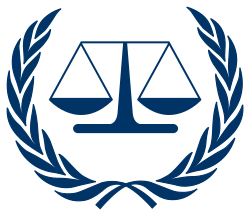2022
On 17 January 2022, the Prosecutor's Office indicated that under Article 18 (2) of the Rome Statute, the administration of Nicolás Maduro had three months to submit its report on investigations by Venezuelan courts into crimes against humanity committed in Venezuela. [19] On 7 April, Tarek William Saab stated that "there is no need" for an investigation by the ICC. [20]
After failing to provide information about investigations by Venezuelan courts, Venezuela asked Karim Khan on 15 April that his office defer the investigation into possible crimes against humanity, claiming that state institutions were investigating or had investigated such crimes. On 20 April, Khan briefed a panel of ICC judges on Venezuela's request, stating that his office would ask the judges to reject the request. [21] [22] [23]
On 1 November, Khan requested the reopening of the Venezuela investigation, just over six months after Venezuela asked the ICC to defer its investigation, stating that "the deferral requested by Venezuela, at this stage, is not justified, and that the resumption of the investigation should be authorized." [24] [25]
In response to the prosecutor's request, the Venezuelan State sent a document on 10 November, opposing the direct participation of victims and their representatives and requesting that the investigation be limited to summaries prepared by the ICC's Office of Public Counsel for Victims and only to cases presented by the Office of the Prosecutor. In the document, Venezuela also asks the ICC judges not to allow the participation in the proceedings of Canada, Colombia, Chile, Paraguay and Peru, the member states that referred the situation of Venezuela to the Court. The NGO PROVEA warned that the communiqué was part of the Maduro government's dilatory strategy to paralyze the ICC prosecutor's investigation for as long as possible, expressing: "This communication ratifies the Venezuelan authorities' contempt for the victims and their claims for justice, as well as their unwillingness to genuinely comply with the principle of complementarity". [26]
2023
On 28 February, the Venezuelan government issued a statement in which it described the accusations against it as "fallacies" and denied that crimes against humanity had occurred in the country, arguing that the investigation had a "political character". [27] [28] [29] The NGO Control Ciudadano warned that such actions by the Maduro government sought to discredit the ICC Prosecutor's Office and that it was evidence that the international court should exercise its jurisdiction over the cases under its investigation. [30] Prosecutor Karim Khan responded to the allegations on 1 March, stating in a statement that the government's claim that no crimes against humanity had been committed was unsubstantiated and without sufficient evidence and that the Venezuelan authorities had not demonstrated that investigations or trials had been conducted at the domestic level that reflected the scope of the Court's ongoing investigation. The Pre-Trial Chamber asked Venezuela to submit a response of no more than ten pages, with a deadline of 20 April. [27] [28] [29] On 3 April, Maduro's government accused Khan of "instrumentalizing" justice "for political purposes". [31]
On 13 March, the International Criminal Court announced that it had received more than 2,000 forms from victims regarding the consultation on whether or not to continue the investigation. In view of the large number of testimonies received, the Court extended the deadline for receiving forms from 21 March to 20 April. [32] [33] [34] On 20 April, the Court announced that the consultation process was "broadly participatory" and that applications included 8,900 victims, 630 families and two organizations. The Victims Participation and Reparations Section received 1,875 applications with their views and concerns, including 1,746 forms, 5 videos and 124 emails or other written documents. [35] [36] [37] [38] The information shared by the victims was compiled by the Section in a 57-page report and published the following day. The report describes that the victims "overwhelmingly" requested that the Court continue with the investigation, [39] that the Venezuelan justice system was unwilling to genuinely investigate human rights violations, [40] and describes testimonies of arbitrary detentions, torture, rape and persecution. Venezuelan Foreign Minister Yván Gil Pinto asked the Pre-Trial Chamber for time until 30 May to respond to the requests. The Chamber rejected the request on 8 May, ruling that it was not the procedural moment to do so and that at the current stage of the investigation no victim had yet been admitted to participate in the case. [39]
On 24 April, the head of the pro-government delegation to the negotiations in Mexico, Jorge Rodríguez, called for a halt to the investigation at the International Criminal Court, stating that one of the objectives of the dialogue with the opposition was to request a halt to the judicial proceedings against the country. [41]
On 8 June, Karim Khan made a third visit to Venezuela, where he met with Maduro's attorney general, Tarek William Saab. The meeting was held at the headquarters of the Public Prosecutor's Office in Caracas and the local press did not have access to it. [42] Khan also met with Gladys Gutiérrez, president of the Supreme Tribunal of Justice of Venezuela, [43] and privately with Nicolás Maduro at the Miraflores presidential palace. Human rights organizations questioned the opacity surrounding the visit. [44] During the visit, the agreement to open an ICC office in Caracas was also confirmed, although without a specific public date. [45] Ali Daniels, co-director of the NGO Acceso a la Justicia, argued that the installation of the office would not affect the course of the Court's investigation. [46] Non-governmental organizations requested that the facility agreement be made public. [47]
On 27 June, the Pre-Trial Chamber authorized Prosecutor Khan to continue investigations into crimes against humanity in Venezuela. The Chamber found that the domestic investigations in Venezuela did not adequately address the magnitude of the case and had unwarranted periods of inactivity. [48] [49] Maduro's government appealed the decision on 5 July, an appeal that was rejected by the Court on 21 July. [50] [51] [52]

